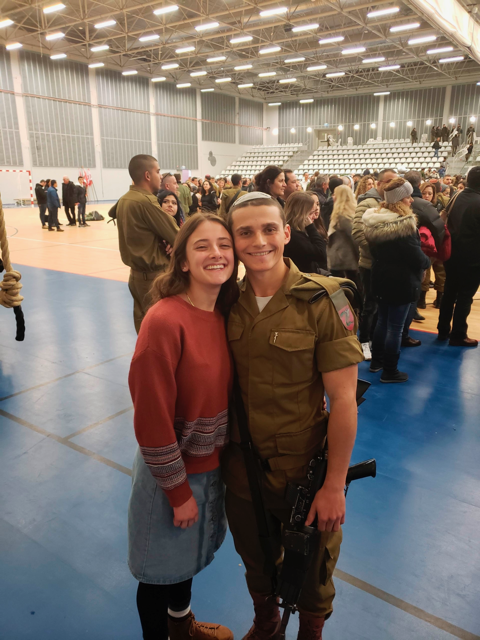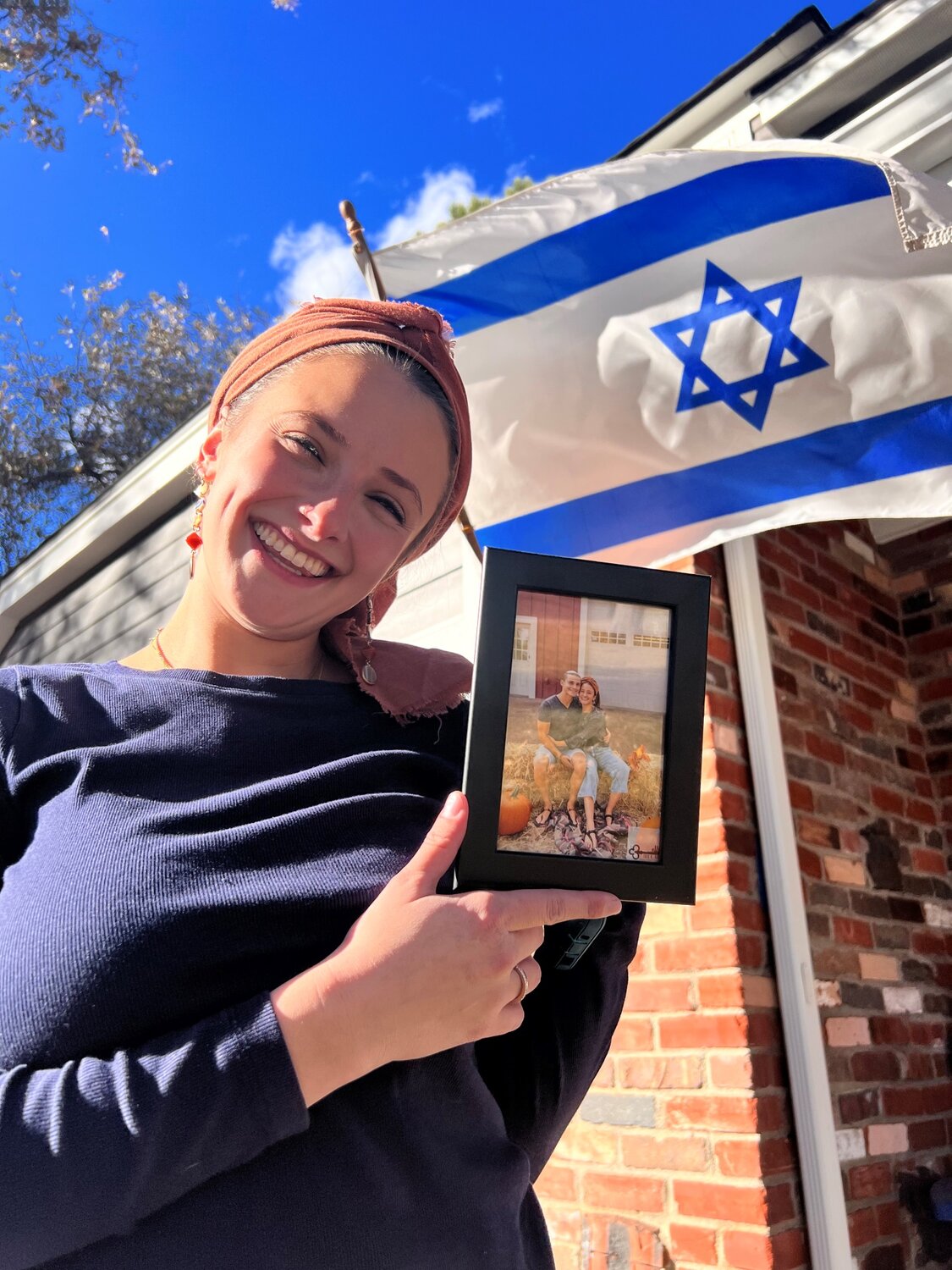Denverite travels to Israel to serve as medic in Israeli army, leaving behind wife and baby

DENVER — On October 7, Elazar Fleischmann had a tough decision to make: Fly to Israel to fight on behalf of his Jewish brethren — or stay home in Denver with his wife and 5-month-old daughter, watching the news of the Israel-Hamas war from afar.
Fleischmann and his wife Eliora, both 25, are dual American-Israeli citizens. They were born and raised in the Denver metro area and lived in Israel from 2018 to 2022 — Elazar to serve in the Israel Defense Forces (IDF), and Eliora to study to be a doula while on a break from college. The couple moved back to Denver in 2022 to be closer to family while they raised their first child.
After nearly 20 hours of discussion on their couch, the two came to a decision: Fleischmann would fly to Israel and serve as a combat medic in the IDF, the country’s national military. Following hours-long conversations to figure out logistics, he then said goodbye to his wife and daughter, Ayla, and flew more than 15 hours to Tel Aviv. By October 9, he had arrived in Israel and was assigned to his unit.
“Looking at our baby Ayla and thinking about all the children [in Israel] that we have to protect, I don't know if it was even a choice for me to stay in America,” Fleischmann said.
Fleischmann is one of more than 300,000 reservists who have joined the approximately 170,000 active-duty Israeli soldiers in the fight against the Palestinian militant group, Hamas, and Israel’s other enemies, including Iran-backed Hezbollah. The mobilization of Israeli troops is one of the largest and quickest in the country’s history.
Like Fleischmann, the reserves come from all over the world, including the United States, Greece, England and Australia. Many traveled to Israel in early October and were met with a severe gear and equipment shortage. Fleischmann received a uniform a few sizes too large, Eliora Fleischmann said. He bought his own boots and used a single medical kit that he brought from home.
Eliora started two GoFundMe drives, one to raise money for her family, and another to support the IDF and purchase medical trauma kits.
The buildup of Israeli troops comes in response to the attacks of October 7, when Hamas crossed into Israel and ambushed a music festival and several villages, or “kibbutzim,” killing 1,200 people and taking more than 240 people hostage.
In retaliation, Israel pummeled the Gaza strip, killing more than 15,000 Palestinians, according to the Gaza Health Ministry. During a weeklong pause in the fighting at the end of November, Hamas released 105 hostages and Israel released 240 Palestinian prisoners.
Fleischmann’s return to Israel marks his second time serving in the Israeli army. After a free trip to Israel with other young American Jews on the Birthright program in 2018, Fleischmann forfeited his ticket back to the United States to join the army and take on Israeli citizenship. He served in the IDF from 2019 to 2022. During that time, he and Eliora, his childhood sweetheart whom he has known since second grade, got engaged.

Elazar Fleischmann is an American citizen and resident of Denver, Colorado who volunteered to serve in the Israel Defense Forces (IDF) from 2019-2022. He chose to go back as a reservist during this latest round of violence.
Photo: Courtesy of Eliora Fleischmann
Fleischmann spoke to Rocky Mountain PBS over the phone from the north of Israel in mid-November during a three-day break that his unit helped arrange. He requested he not be filmed out of fear for his safety.
Fleischmann said he had friends who were killed on their bases in the October 7 attack, and he knew of others who were taken hostage.
“I don't think I'm just protecting people who live here in Israel,” he said of his decision to return. "I know I'm also protecting the livelihood and the well-being of communities around the world of Jews and Israelis.”
As a lone soldier, or “chayal boded,” he didn’t have any family to go home to, so the CEO of a chain of hotels in Israel invited him to stay at her hotel for free. Fleischmann said all 300 rooms were full — primarily with families who were evacuated from the kibbutzim in the south and others who fled for safety from rocket attacks in the north.
“It's very rare that you see anyone in this hotel that is a full and complete family,” Fleischmann said. “Everyone you see has someone who has been taken hostage or is right now in a hospital overcoming injuries.”
As the only combat medic in his unit — and the only soldier in his troop from abroad — Fleischmann’s job is similar to an emergency medical technician, or EMT, but on the frontlines in combat zones. He said his job requires him to treat anyone he encounters, including suicide bombers.
“In combat, if you see a fallen soldier who might literally be a terrorist who just killed some of your brothers, your aunts, you know, you have a duty,” he said. “And we swear on this when we get our medic’s badge. I believe that at the end of the day, the last thing that you can do that is always absolutely right is you can fight for life and you can save lives.”
Fleischmann said some days he and his unit have been hit by rocket attacks or drones dropping grenades, while other days it’s been quiet. Since the start of the war with Gaza, about 400 IDF soldiers have been killed — the majority of which died on the day of the October 7 attacks.
“Your eyes and your ears are always tuned to what could possibly harm you and your team,” he said.
One night Fleischmann jolted awake to the sound of someone in his unit whistling and couldn’t fall back sleep.
“It’s very similar to the sound you hear seconds before a rocket or missile hits your location,” he said.
Since the start of the war, Israel's military said it has destroyed 500 of the 800 recently discovered underground tunnel shafts that Hamas has built over decades. The IDF claims the shafts are used to serve as Hamas’ operational and military bases, replete with weapons, electricity and ventilation — and are estimated to stretch 300 miles long. The IDF says they are used to attack Israelis and are strategically located in heavily populated Palestinian civilian areas including kindergartens, mosques and hospitals.
The resulting high casualty rate in Gaza, of which 70% have been women and children according to the Health Ministry in Gaza, has led to international calls for a cease-fire, including from France and Spain, as well as non-governmental organizations such as Doctors Without Borders.
“The way Israel is prosecuting this war is causing massive death and suffering among Palestinian civilians and is inconsistent with international norms and laws,” wrote Avril Benoit, the executive director of Doctors Without Borders in an open letter to United States President Joe Biden.
“Medics in Gaza are exhausted and overwhelmed by the scale of human suffering they experience every day,” Benoit said in the statement, urging a “sustained ceasefire.”
Fleischmann believes there’s a big misperception around the war: “This really isn't a disagreement between Palestinians and Israelis,” he said, but rather a war between Israel and Hamas."
According to the Israel Democracy Institute, 21% of Israel’s population is Arab — and 1% serve in Israel’s army, with numbers increasing in recent years. Fleischmann said several Palestinians have served alongside him in the IDF.
Back home in Denver, Eliora stays with her parents every weekend. They and her in-laws are helping to raise Ayla. Many in her Jewish community have also offered to babysit — to the point that, Eliora said, her mom often jokingly says to them, “you’re in the queue.”

Eliora holds a photo of her and her husband Elazar outside her parents’ home. “What's important is connecting with each other on a real level during this time,” she said, “and to stop this division that we have.”
Photo: Julio Sandoval, Rocky Mountain PBS
Eliora said she is experiencing her own wartime wounds.
“Trauma is not unique to the soldier who’s there, but it’s also the family who goes through it with them,” she said. She has reached out to two organizations that support partners of soldiers and has been in touch with several wives of American and IDF soldiers for advice and support.
“We're not there. We can't see what's happening,” she said. “We just see the media and we hear things.”
Up until recently, Eliora had the words “I stand with Israel, do you?” painted on her car, but she took it down at her parents' recommendation for her and her daughter’s safety. She said someone said to her, “I hope your husband comes home in a coffin.” She responded by praying for them and wishing them safety.
She worries about her husband and has discussed with him the possibility of never seeing him again, but supports what he is doing.
They try to stay in touch daily by text and, when possible, over the phone, though she said the conversations are usually brief due to unstable cell service. She shares photos and voice memos of their daughter, mostly babbling, so Elazar can watch Ayla as she grows.
Elazar Fleischmann does not know when he will be back in Denver, and plans to stay in Israel for as long as he is needed.
“The prayer in my heart is that all people should be safe,” he said. “We just want this to come to an end as quickly as possible.”
Andrea Kramar is the investigative multimedia journalist at Rocky Mountain PBS. andreakramar@rmpbs.org.
Julio Sandoval, senior photojournalist at Rocky Mountain PBS, contributed to the video. Juliosandoval@rmpbs.org.